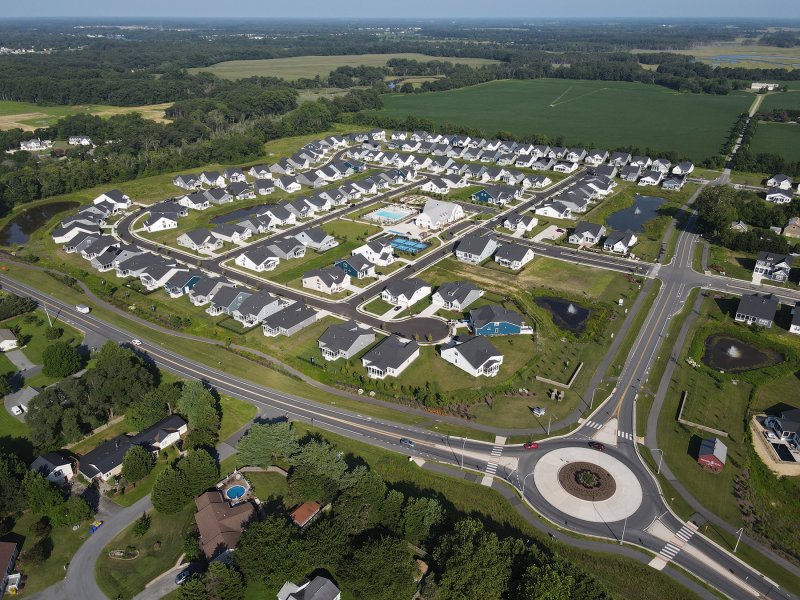Sussex land-use reform group insists on expanding recommendations
The review of recommendations to restrict development in Sussex County came to a halt July 24, as a land-use reform working group objected to limitations on the suggestions they could offer.
At the start of the meeting of the 10-member panel, moderator Andrew Bing said the discussion would only entail clarifying the 17 recommendations members received a day earlier.
He said the next meeting, set for Tuesday, Aug. 5, would be to the gauge the group’s support for each before they are sent to Sussex County Council for consideration.
“It was very clear at the last couple of meetings that there were opportunities for you all to suggest additional things,” Bing said. “We gave everyone that opportunity to do that. Our view is that these 17 draft recommendations are the final list of those draft recommendations of this group. You’ve had probably a good six weeks of time to look at the recommendations.”
By the end of the meeting, the group had reviewed only eight recommendations. Bing said the process would be reevaluated, and he agreed to reopen it for new suggestions. An optional meeting Thursday, Aug. 21, is now a firm date, and there are suggestions to extend the process.
The partial list of recommendations reviewed July 24 inlcude:
- Align future land-use map
- Comprehensive rezoning
- Establish clear standards for rezoning
- Define missing middle housing types
- Permit missing middle housing in strategic areas
- Establish bulk and setback standards for missing middle housing and adjust height, building length and separation caps in growth areas
- Modernize CR-1 districts to support mixed-use residential corridors
- Establish a process to coordinate phasing of transportation improvements for major developments in designated growth areas that involves the state, county and public.
Discussion of several recommendations was punctuated by complaints that ideas lacked detail and the working group would not receive an opportunity to propose specific changes.
“Some of the ideas from the group were filtered out, and we don’t necessarily know why or how or the criteria,” said Jon Horner, who represents the Home Builders Association of Delaware.
He asked how it was decided what would be on the list. He said there are ideas that at least five members support, such as limiting public hearings for some approvals. That was not on the final list of draft recommendations.
Deputy Attorney Vince Robertson said state law sets rules for public comment on some matters.
While one goal is to provide clarity in the rules, Mike Riemann, a representative of the American Council of Engineering Companies, said objective criteria have not been established.
“I’m hearing two sides of this issue in complete agreement that this needs to be addressed,” Riemann said. “I’m hearing the preservation side say it. I’m hearing the development side say it. That tells me something, that this should be on the table. I’m looking at these criteria right now. They’re extremely subjective. One of the things that this group has talked about from the beginning is that we need clarity. It should be on the list.”
Riemann also said he expected comprehensive rezoning would be an overhaul of zoning and that growth zones would be identified by the working group.
“It would be a complete approach,” he said.
Bing said the group will not map out the growth areas, but could determine criteria for growth zones and changes to zoning ordinances.
Jill Hicks, president of the Sussex Preservation Coalition, said a suggestion that limits development in rural areas to one house per acre did not make the final list.
While group members wanted to add recommendations, Bing said the county can address some issues beyond this current process, and decisions had to be made to move the process along.
David Edgell, director of the Office of State Planning Coordination, said ideas that do not make it into recommendations should still be passed to council as issues to consider in the future.
Organizers of the working group process will have to consider their next steps.
“We’re not exactly where we thought we should be,” Bing said.
Kevin Conlon came to the Cape Gazette with nearly 40 years of newspaper experience since graduating from St. Bonaventure University in New York with a bachelor's degree in mass communication. He reports on Sussex County government and other assignments as needed.
His career spans working as a reporter and editor at daily newspapers in upstate New York, including The Daily Gazette in Schenectady. He comes to the Cape Gazette from the Cortland Standard, where he was an editor for more than 25 years, and in recent years also contributed as a columnist and opinion page writer. He and his staff won regional and state writing awards.
Conlon was relocating to Lewes when he came across an advertisement for a reporter job at the Cape Gazette, and the decision to pursue it paid off. His new position gives him an opportunity to stay in a career that he loves, covering local news for an independently owned newspaper.
Conlon is the father of seven children and grandfather to two young boys. In his spare time, he trains for and competes in triathlons and other races. Now settling into the Cape Region, he is searching out hilly trails and roads with wide shoulders. He is a fan of St. Bonaventure sports, especially rugby and basketball, as well as following the Mets, Steelers and Celtics.























































